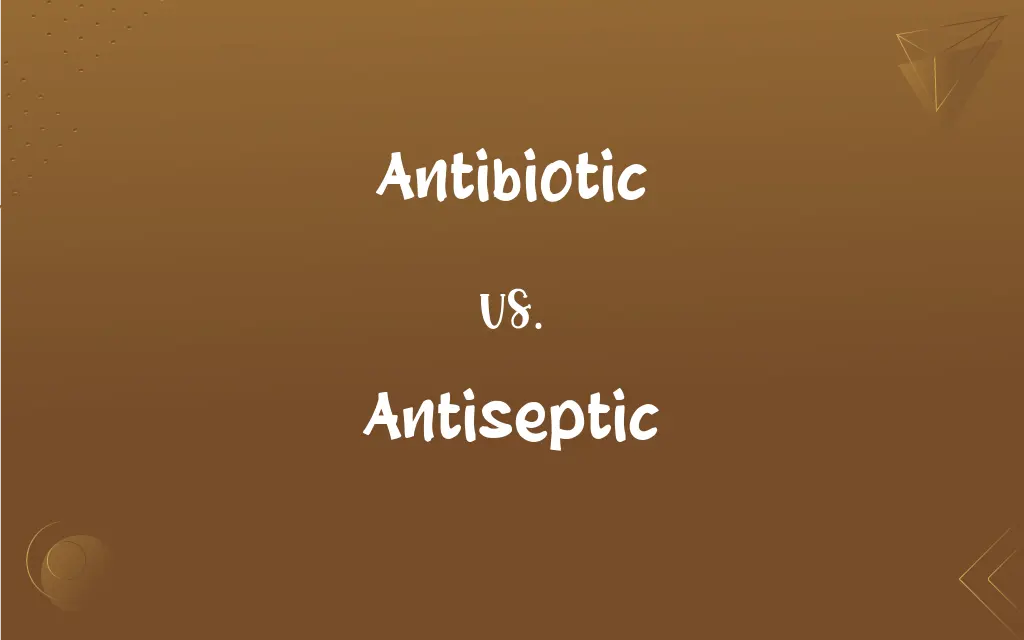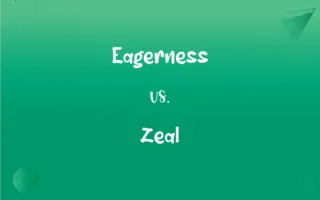Antibiotic vs. Antiseptic: What's the Difference?
Edited by Aimie Carlson || By Janet White || Published on November 9, 2023
Antibiotics are drugs that treat bacterial infections inside the body, while antiseptics prevent microbial growth on surfaces or skin.

Key Differences
Antibiotics are medicinal substances specifically designed to combat or inhibit the growth of bacteria inside the body. They can be natural or synthetic and are often prescribed by physicians to treat bacterial infections. Antiseptics, conversely, are substances that stop or slow down the growth of microorganisms on external surfaces, including the skin, and are not usually ingested.
Antibiotics can target specific bacteria or a broad range of them, and their primary function is therapeutic. Overuse or misuse of antibiotics can lead to antibiotic resistance, where bacteria evolve mechanisms to evade the drug. On the other hand, antiseptics are more about prevention. They are commonly used during medical procedures to disinfect surfaces, equipment, and skin to avoid the spread of infections.
While antibiotics usually require a prescription, many antiseptics are available over the counter. Popular examples of antiseptics include hydrogen peroxide, iodine solutions, and alcohol-based products. Conversely, penicillin and amoxicillin are examples of antibiotics.
It's vital not to confuse the two: antibiotics should not be used as antiseptics and vice versa. Using antibiotics without a valid medical reason can contribute to the global problem of antibiotic resistance. Meanwhile, ingesting antiseptics can be harmful or even fatal.
Comparison Chart
Primary Use
Treat bacterial infections inside the body
Prevent microbial growth on external surfaces
ADVERTISEMENT
Nature
Can be specific or broad-spectrum
Broad-spectrum against microbes
Availability
Usually requires prescription
Often available over-the-counter
Examples
Penicillin, amoxicillin
Hydrogen peroxide, iodine solutions
Potential Issues
Overuse can lead to antibiotic resistance
Ingesting can be harmful or fatal
Antibiotic and Antiseptic Definitions
Antibiotic
A drug used to treat bacterial infections.
The doctor prescribed an antibiotic to combat the infection.
ADVERTISEMENT
Antiseptic
Substance that disinfects skin or surfaces.
Before the injection, the nurse applied an antiseptic to the skin.
Antibiotic
A substance that combats bacterial diseases.
The patient needed a strong antibiotic for the severe infection.
Antiseptic
Material used to combat microorganisms on outer areas.
They used an antiseptic wipe to clean the area.
Antibiotic
A drug preventing bacterial replication.
Without the right antibiotic, the patient's condition worsened.
Antiseptic
Product preventing infections on external wounds.
She always carried an antiseptic spray in her first aid kit.
Antibiotic
Medication targeting harmful bacteria.
Overuse of antibiotics can lead to resistant bacteria.
Antiseptic
An agent preventing microbial growth on surfaces.
She cleaned the wound with an antiseptic solution.
Antibiotic
Medicine that inhibits bacteria growth or kills them.
Penicillin was a groundbreaking antibiotic discovered in the 20th century.
Antiseptic
Capable of preventing infection by inhibiting the growth of infectious agents.
Antibiotic
A substance, such as penicillin or erythromycin, produced by or derived from certain microorganisms, including fungi and bacteria, that can destroy or inhibit the growth of other microorganisms, especially bacteria. Antibiotics are widely used in the prevention and treatment of infectious diseases.
Antiseptic
Devoid of infectious agents; aseptic.
Antibiotic
Of or relating to antibiotics.
Antiseptic
Of or associated with the use of antiseptics.
Antibiotic
Of or relating to antibiosis.
Antiseptic
Devoid of enlivening or enriching qualities
"This is ... not at all lighthearted or amiable music. In fact, the tone is unremittingly sober and antiseptic" (Donal Henahan).
Antibiotic
Destroying life or preventing the inception or continuance of life.
Antiseptic
Free of disturbing or unpleasant features; sanitized
An antiseptic version of history.
Antibiotic
(pharmaceutical drug) Any substance that can destroy or inhibit the growth of bacteria and similar microorganisms, generally transported by the lymphatic system.
Antiseptic
A substance that prevents infection by inhibiting the growth of infectious agents.
Antibiotic
(pharmaceutical effect) Of or relating to antibiotics.
Antiseptic
Of, or relating to antisepsis, or the use of antiseptics.
Antibiotic
(obsolete) Of or relating to the theory that extraterrestrial life does not exist.
Antiseptic
(pharmaceutical effect) Capable of preventing microbial infection.
Antibiotic
A chemical substance derived from a mold or bacterium that kills microorganisms and cures infections.
Antiseptic
Very clean; aseptic.
Antibiotic
Any chemical substance having therapeutically useful antibacterial or antifungal activity; - used commonly but loosely for synthetic as well as natural antimicrobial agents.
Antiseptic
Free of unpleasantness; prim, sanitized or bowdlerized.
Antibiotic
Of or pertaining to an antibiotic.
Antiseptic
(pharmaceutical drug) Any substance that inhibits the growth and reproduction of microorganisms. Generally includes only those that are used on living objects (as opposed to disinfectants) and aren't transported by the lymphatic system to destroy bacteria in the body (as opposed to antibiotics).
Antibiotic
Having antimicrobial activity; capable of killing microbes.
Antiseptic
Counteracting or preventing putrefaction, or a putrescent tendency in the system; antiputrefactive.
Antibiotic
A chemical substance derivable from a mold or bacterium that kills microorganisms and cures infections;
When antibiotics were first discovered they were called wonder drugs
Antiseptic
A substance which kills or retards the growth of microorganisms, especially when used for protection against infection; a substance which prevents or retards putrefaction, or destroys, or protects from, putrefactive organisms; as, carbolic acid, alcohol, cinchona, and many other agents sold commercially.
Antibiotic
Of or relating to antibiotic drugs
Antiseptic
A substance that destroys micro-organisms that carry disease without harming body tissues
Antiseptic
Thoroughly clean and free of or destructive to disease-causing organisms;
Doctors in antiseptic green coats
The antiseptic effect of alcohol
It is said that marjoram has antiseptic qualities
Antiseptic
Clean and honest;
Antiseptic financial practices
Antiseptic
Freeing from error or corruption;
The antiseptic effect of sturdy criticism
Antiseptic
Made free from live bacteria or other microorganisms;
Sterilized instruments
Antiseptic
(extended sense) of exceptionally clean language;
Lyrics as antiseptic as Sunday School
Antiseptic
A compound killing or stopping pathogens externally.
After the minor surgery, they dressed the area with an antiseptic.
FAQs
Are all antiseptics safe for skin?
Most antiseptics are safe for skin, but some might cause irritation or allergic reactions.
What are antibiotics primarily used for?
Antibiotics are used to treat bacterial infections inside the body.
Can I use an antiseptic to clean my hands?
Yes, many hand sanitizers are antiseptic products designed for that purpose.
Can antibiotics kill viruses?
No, antibiotics target bacteria, not viruses.
Is alcohol an effective antiseptic?
Yes, alcohol is an effective antiseptic that can kill many types of microbes.
When should I use an antiseptic?
Antiseptics are typically used to disinfect wounds or surfaces to prevent infections.
Why can't I take antibiotics for a cold?
Colds are viral, and antibiotics only treat bacterial infections.
Why shouldn't I use antibiotics without a prescription?
Misusing antibiotics can lead to antibiotic resistance, making infections harder to treat.
Can taking antibiotics cause side effects?
Yes, some people might experience side effects from antibiotics, such as digestive issues.
How do bacteria become resistant to antibiotics?
Through mutation and selection, bacteria can evolve to resist the effects of antibiotics.
Can antibiotics treat fungal infections?
No, antibiotics are specifically designed to target bacteria, not fungi.
How do I apply an antiseptic to a wound?
Clean the wound and apply the antiseptic as directed, usually with a clean cloth or cotton.
Can I ingest an antiseptic?
No, antiseptics are for external use only and can be harmful if ingested.
How do antibiotics work?
Antibiotics work by either killing bacteria or preventing them from multiplying.
Should I dilute an antiseptic before use?
Follow the product's directions. Some antiseptics need dilution, while others don't.
Can I take antibiotics as a preventive measure?
Antibiotics should only be taken when prescribed and not as a preventive measure.
What's the difference between an antiseptic and a disinfectant?
Both kill or inhibit microbes, but antiseptics are safe for skin, while disinfectants are for surfaces.
Is it okay to use an antiseptic on a burn?
Some antiseptics can be used on burns, but always read the label or ask a healthcare professional.
Can antiseptics expire?
Yes, like all products, antiseptics have an expiration date and can lose effectiveness over time.
How long does it take for an antibiotic to start working?
It varies, but most antibiotics start working within a few hours to a couple of days.
About Author
Written by
Janet WhiteJanet White has been an esteemed writer and blogger for Difference Wiki. Holding a Master's degree in Science and Medical Journalism from the prestigious Boston University, she has consistently demonstrated her expertise and passion for her field. When she's not immersed in her work, Janet relishes her time exercising, delving into a good book, and cherishing moments with friends and family.
Edited by
Aimie CarlsonAimie Carlson, holding a master's degree in English literature, is a fervent English language enthusiast. She lends her writing talents to Difference Wiki, a prominent website that specializes in comparisons, offering readers insightful analyses that both captivate and inform.







































































